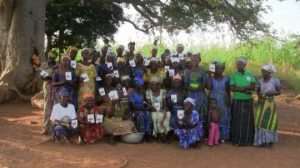
The Village Savings and Loan Association (VSLA) intervention, introduced by the Environmental Protection Agency (EPA), under the Ghana Environmental Management Project (GEMP), has improved food security among many households in the Upper East Region.
This was made known when Mr. Asher Nkegbe, Regional Director of the EPA, undertook a monitoring visit to some communities in the region with some media personnel to see how the project was fairing.
Ms. Janet Pwamang, Secretary to the Nayagnia VSLA group, said through the intervention, members who were mostly women had accessed loans from the savings they made, to help them improve upon their livelihoods.
She said one of the major benefits they had derived from the intervention, as women groups, was that women were able to secure loan facilities every farming season to procure farm inputs to undertake farming activities.
Ms. Pwamang said, unlike the past when majority of the women sat idle, particularly during the dry season, they were now able to engage themselves in petty trading, including pito brewing, and animal and birds rearing, among others, to support the work of their husbands.
Whilst commendi
ng the EPA, GEMP, and World Bank for supporting the project by forming and building the capacity of the women to begin the VSLA, Ms. Pwamang appealed to management of the programme to replicate it in other communities.
The Village Savings and Loan Association (VSLA) is a group of people who save together and take small loans from those savings. VSLAs are self-managed groups, which do not receive any external capital, and provide people with a safe place to save their money, access small loans, and obtain emergency insurance.
The approach is characterised by a focus on savings, asset building and the provision of credit proportionate to the needs and repayment capacities of the borrowers. Groups are low-cost, simple to manage, and can be seen as a first step for people to reach a more formal and wider array of financial services.
Source: GNA




 SSNIT must be managed without gov’t interference – Austin Gamey
SSNIT must be managed without gov’t interference – Austin Gamey
 Ejisu by-election could go either way between NPP and independent candidate — Gl...
Ejisu by-election could go either way between NPP and independent candidate — Gl...
 We never asked ministers, DCEs to bring NPP apparatchiks for returning officer r...
We never asked ministers, DCEs to bring NPP apparatchiks for returning officer r...
 No one denigrated the commission when you appointed NDC sympathizers during your...
No one denigrated the commission when you appointed NDC sympathizers during your...
 Used cloth dealers protests over delayed Kumasi Central Market project
Used cloth dealers protests over delayed Kumasi Central Market project
 A/R: Kwadaso onion market traders refuse to relocate to new site
A/R: Kwadaso onion market traders refuse to relocate to new site
 Dumsor: Corn mill operators at Kaneshie market face financial crisis
Dumsor: Corn mill operators at Kaneshie market face financial crisis
 Jamestown fishermen seek support over destruction of canoes by Tuesday's heavy d...
Jamestown fishermen seek support over destruction of canoes by Tuesday's heavy d...
 Election 2024: EC to commence voter registration exercise on May 7
Election 2024: EC to commence voter registration exercise on May 7
 Public schools rebranding: We’re switching to blue and white, we’re painting all...
Public schools rebranding: We’re switching to blue and white, we’re painting all...
